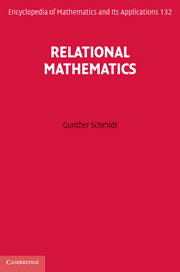Book contents
- Frontmatter
- Contents
- Notes on illustrations
- Preface
- 1 Introduction
- PART I REPRESENTATIONS OF RELATIONS
- PART II OPERATIONS AND CONSTRUCTIONS
- PART III ALGEBRA
- PART IV APPLICATIONS
- PART V ADVANCED TOPICS
- Appendix A Notation
- Appendix B Proofs postponed from Part II
- Appendix C Algebraic visualization
- Appendix D Historical annotations
- References
- Symbols
- Index
PART IV - APPLICATIONS
Published online by Cambridge University Press: 05 May 2013
- Frontmatter
- Contents
- Notes on illustrations
- Preface
- 1 Introduction
- PART I REPRESENTATIONS OF RELATIONS
- PART II OPERATIONS AND CONSTRUCTIONS
- PART III ALGEBRA
- PART IV APPLICATIONS
- PART V ADVANCED TOPICS
- Appendix A Notation
- Appendix B Proofs postponed from Part II
- Appendix C Algebraic visualization
- Appendix D Historical annotations
- References
- Symbols
- Index
Summary
So far we have concentrated on the foundations of relational mathematics. Now we switch to applications. A first area of applications concerns all the different variants of orderings as they originated in operations research: weakorders, semiorders, intervalorders, and block-transitive orderings. With the Scott-Suppes Theorem in relational form as well as with the study of the consecutive 1s property, we here approach research level.
The second area of applications concerns modelling preferences with relations. The hierarchy of orderings is considered investigating indifference and incomparability, often starting from so-called preference structures, i.e., relational outcomes of assessment procedures. A bibliography on early preference considerations is contained in [2].
The area of aggregating preferences with relations, studied as a third field of applications, is relatively new. It presents relational measures and integration in order to treat the trust and belief of the Dempster–Shafer Theory in relational form. In contrast, the fuzzy approach is well known, with the coeficients of matrices stemming from the real interval [0, 1]; it comes closer and closer to relational algebra proper. In the present book, a direct attempt is made. Also t-norms and De Morgan triples can be generalized to a relational form.
- Type
- Chapter
- Information
- Relational Mathematics , pp. 301 - 302Publisher: Cambridge University PressPrint publication year: 2010

